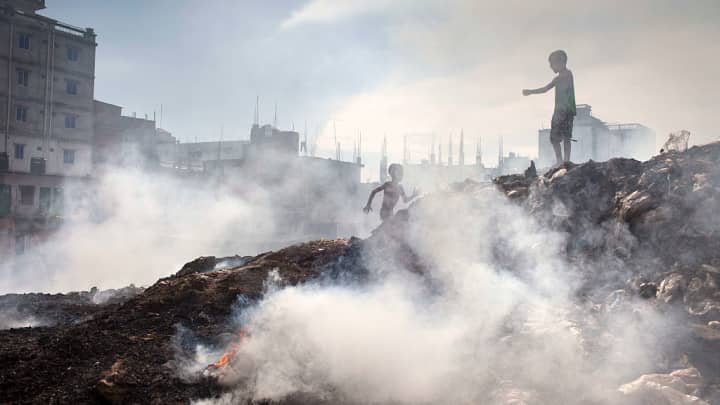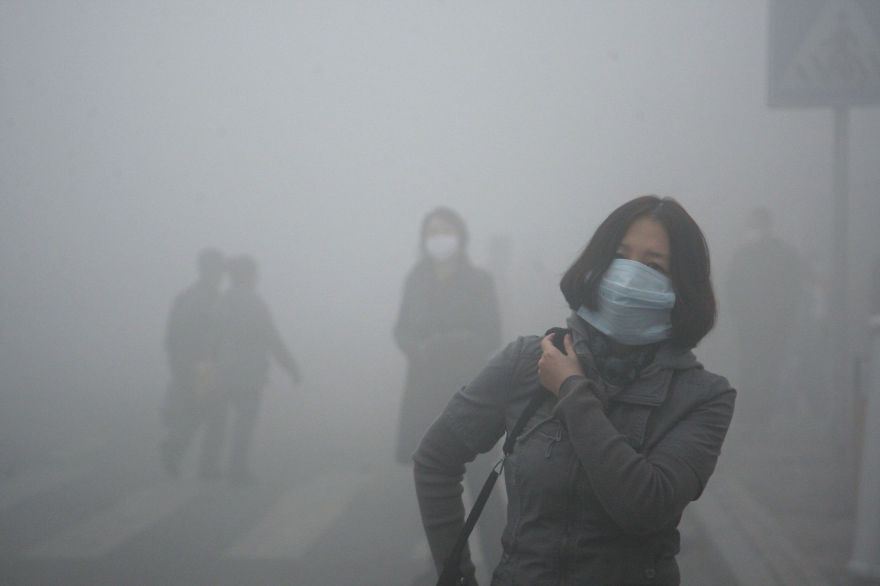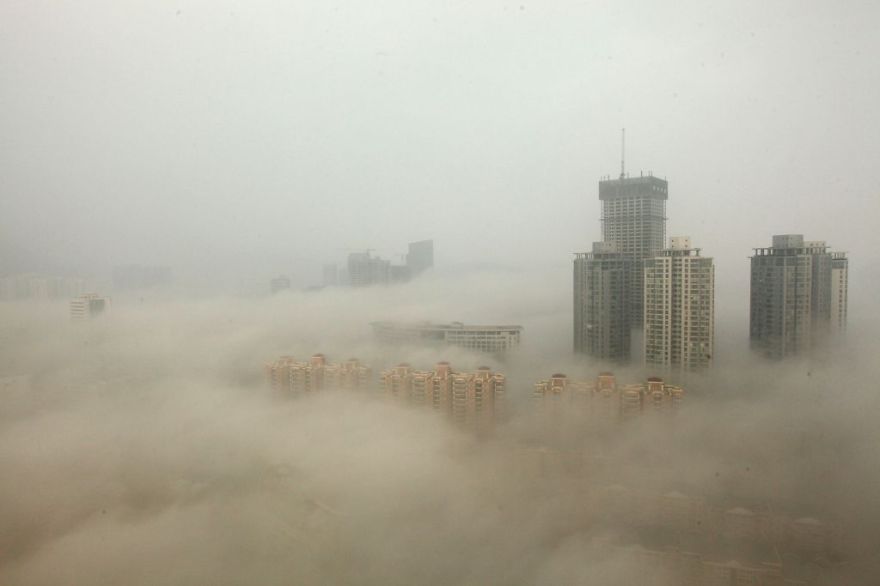Deadly air pollution in China has long been out of control
Chinese people suffer from a multitude of respiratory diseases
Although the government has long been aware of negative effects of air and water pollution, they have been slow to act upon the problems
Toxic water pollution from industrial and human wastes fill every waterway

Solid waste like plastics cover every shore

Children play on piles of garbage releasing toxic gases
There are currently an estimated 4.5 billion people around the world exposed to levels of particulate air pollution that are at least twice what the World Health Organization (WHO) considers safe. Yet, the impact of sustained exposure to pollution on a person's life expectancy has largely remained a vexingly unanswered question -- until now.
A study published today in the Proceedings of the National Academy of Sciences finds that a Chinese policy is unintentionally causing people in northern China to live 3.1 years less than people in the south due to air pollution concentrations that are 46 percent higher. These findings imply that every additional 10 micrograms per cubic meter of particulate matter pollution (PM10) reduces life expectancy by 0.6 years. The elevated mortality is entirely due to an increase in cardiorespiratory deaths, indicating that air pollution is the cause of reduced life expectancies to the north.
"These results greatly strengthen the case that long-term exposure to particulates air pollution causes substantial reductions in life expectancy. They indicate that particulates are the greatest current environmental risk to human health, with the impact on life expectancy in many parts of the world similar to the effects of every man, woman and child smoking cigarettes for several decades," says study co-author Michael Greenstone, the director of the Energy Policy Institute at the University of Chicago (EPIC) and the Milton Friedman Professor in Economics, the College and the Harris School. "The histories of the United States, parts of Europe, Japan and a handful of other countries teach us that air pollution can be reduced, but it requires robust policy and enforcement."
The study exploits China's Huai River policy, which provided free coal to power boilers for winter heating to people living north of the river and provided almost no resources towards heating south of the river. The policy's partial provision of heating was implemented because China did not have enough resources to provide free coal nationwide. Additionally, since migration was greatly restricted, people exposed to pollution were generally not able to migrate to less polluted areas. Together, the discrete change in policy at the river's edge and the migration restrictions provide the basis for a powerful natural experiment that offers an opportunity to isolate the impact of sustained exposure to particulates air pollution from other factors that affect health.
"Unveiling this important information helps build the case for policies that ultimately serve to improve the lives of the Chinese people and the lives of those globally who suffer from high levels of air pollution," says study co-author Maigeng Zhou, deputy director of the National Center for Chronic and Non-communicable Disease Control and Prevention of the Chinese Center for Disease Control and Prevention.
Overall, the study provides solutions to several challenges that have plagued previous research. In particular, prior studies: 1) rely on research designs that may be unlikely to isolate the causal effects of air pollution; 2) measure the effect of pollution exposure for a relatively short period of time (e.g., weekly or annually), failing to shed light on the effect of sustained exposure; 3) examine settings with much lower pollution concentrations than those currently faced by billions of people in countries, including China and India, leaving questions about their applicability unanswered; 4) measure effects on mortality rates but leave the full loss of life expectancy unanswered.
Broader Implications -- Introducing the Air Quality-Life Index (AQLI)
Importantly, the results from this paper can be generalized to quantify the number of years that air pollution reduces lifespans around the globe -- not just in China. Specifically, Greenstone and his colleagues at EPIC used the finding that an additional 10 micrograms per cubic meter of PM10 reduces life expectancy by 0.6 years to develop a new pollution index, the Air Quality-Life Index (AQLI). The index allows users to better understand the impact of air pollution on their lives by calculating how much longer they would live if the pollution in the air they breathe were brought into compliance with national or WHO standards.
"The AQLI uses the critical data and information gathered from our China research and applies it to every country, allowing the billions of people around the world who are exposed to high air pollution levels to estimate how much longer they would live if they breathed cleaner air," says Greenstone.
Do we want our kids to live longer?? All the scientific evidence and the scientific answers are right in front of us. This requires a global effort. Air and water pollution from other countries affects us just as much as our own. Winds and ocean currents carry it to us and seriously affect our quality of life, our wildlife and aquatic life. Only by cooperation, not isolation, can we mend our damaged planet.




This is a must needed article ... come on folks , we need to get off the couch and do something
ReplyDeleteEvery little bit helps , tell one person a day ... well at least one a week and you will get some takers .
Great Shadow.
Love Witchy
Thank you Witchy
ReplyDeleteAir pollution has now been proven to reduce human lifespans. I think that makes it critical to get world wide regulations in place to reduce emissions. I don't know what the world is waiting for.
Love Shadow